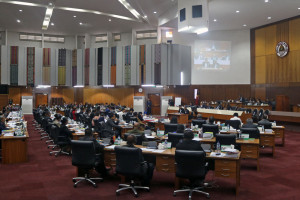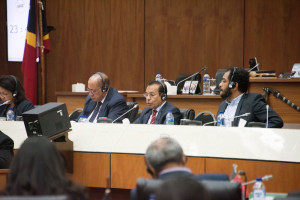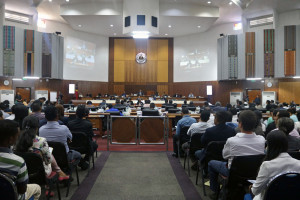Government presents 2018 State Budget in the National Parliament

The VIII Constitutional Government presented today, August 27, 2018, in the National Parliament the General State Budget (OGE) for the current fiscal year of 2018
About sixty days after his swearing-in as Prime Minister, Taur Matan Ruak expressed "great satisfaction at this important step in the process of reestablishing political and financial normality, with the approval of the budget that will govern the country's expenses in the next four months of fiscal year 2018".
The budget presented is divided into three distinct phases: The first phase, covering the period between January and June 2018, during which it was carried out by the VII Constitutional Government, in a duodecimal regime, with expenses totaling US$ 402.1 million; the second phase, covering the period from July to August 2018, which continued to ensure the implementation of public expenditure in a duodecimal regime, by the VIII Constitutional Government, already in a critical treasury position, with a balance on August 10 of just twenty million US dollars, to meet current expenditures of approximately thirty million dollars a month; and the third phase, covering the period from September to December 2018, with estimated expenditures up to the end of the fiscal year, budgeted at US$ 715,500 million.
Taur Matan Ruak stated that the OGE, now presented, will "equip the Government with the financial and budgetary conditions necessary to achieve the vision reflected in the second phase of the National Development Strategic Plan (NSDP 2016-2020) and the Roadmap for the Implementation of the Sustainable Development Goals, whose efforts are aimed at "the development of infrastructure, human resources and diversification of the non-oil economy."
The Prime Minister also added that this is "a vision that aims to transform Timor-Leste into a Rich, Strong and Secure Country, taking it out of the list of low-income countries and turning it into a thriving middle-high society by 2030".
The OGE includes "the revenues and expenses already incurred during the current fiscal year as well as the expenses that the State must carry out until the end of this year, to ensure the provision of public goods and services to our citizens and create political and financial conditions in order to resume the path of economic and social development in the country, through the adoption of measures that stimulate economic growth".
The Government expects to raise US$ 1,279.6 million by the end of the current fiscal year, of which US$ 984.8 million result from transfers from the Petroleum Fund and US$ 188.8 million constitute domestic revenues.
In the total amount of expenses, which includes the amount of loans, it is expected that the total sum will reach US$ 1,279.6 million, divided in the following categories and amounts: US$ 200,312 million for salaries and wages; US$ 421,666 million for goods and services; US$ 261,925 million for public transfers; US$ 3,659 million for Minor Capital; and US$ 392.037 million in Development Capital, which includes the Infrastructure and Loans Fund.
 The Prime Minister pointed out that the Eight Constitutional Government remains committed to controlling expenses, with the 2018 Budget representing a savings of US$ 107,226 million compared to the 2017 Budget and a savings of US$ 663 million in comparison with the 2016 OGE. In addition, the Government "considers it prudent to seek a balanced relationship between the fulfillment of its political, constitutional and legal obligations, the provision of public goods and services to citizens and the creation of an environment conducive to the intensification of economic activity, while ensuring a conscientious use of the financial resources of our People". He also reaffirmed the ambition and objective of the Government to resume the pace of growth of the economy, which has been interrupted, returning to an annual economic growth of 7% per year, starting from the next financial year”.
The Prime Minister pointed out that the Eight Constitutional Government remains committed to controlling expenses, with the 2018 Budget representing a savings of US$ 107,226 million compared to the 2017 Budget and a savings of US$ 663 million in comparison with the 2016 OGE. In addition, the Government "considers it prudent to seek a balanced relationship between the fulfillment of its political, constitutional and legal obligations, the provision of public goods and services to citizens and the creation of an environment conducive to the intensification of economic activity, while ensuring a conscientious use of the financial resources of our People". He also reaffirmed the ambition and objective of the Government to resume the pace of growth of the economy, which has been interrupted, returning to an annual economic growth of 7% per year, starting from the next financial year”.
Taur Matan Ruak referred to the Government's commitment to "minimize the risks normally associated with public investment, investing more and more on efficiency, efficacy, savings and in combating waste and unnecessary or superfluous expenses", fulfilling the objective of increasing domestic revenues and reducing the dependence on the Petroleum Fund. This reduction is not possible "without investing in human capital and without continuing to invest in basic, transversal and essential infrastructures for all sectors of the economy”.
The Prime Minister ended his speech calling for "the interest, participation and contribution of all" so that the OGE 2018 translates "the real needs of people, for a more modern, developed and prosperous nation."
After the intervention of the Prime Minister, Commission C of the National Parliament presented its assessment, conclusions and recommendations for the 2016 Budget.
The general debate of the Law for the General State Budget of 2018 in the National Parliament will continue until August 29. Parliament will then vote on hold a general vote on the budget law. The discussion and voting in ‘specialty’, during which each article of the governmental proposal is analyzed in detail, begins on August 31 and ends on September 6, the day scheduled for the final global vote.
To read the speech of the Prime Minister presenting the OGE 2018 click here for portuguese version and here for tetun version.










































